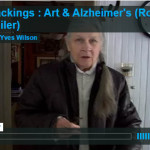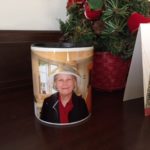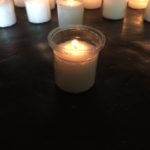We are all so relieved that last fall B Smith was returned home safely after having gone missing for 17 hours in New York City. B Smith said “I just wanted to be free”. Perhaps that’s what all victims of Alzheimer’s disease are feeling when they wander or just feel trapped in institutions or the restraints of their own bodies and minds as they become more and more helpless. Well now B Smith is coming back fighting by advocating for The Brain Health Registry: an important study that will shed light in many ways on how Alzheimer’s progresses and how it impacts different populations:

Al Roker, B. Smith and Dan Gasby.
At first, “you don’t believe it—there’s total denial,” said Gasby. “And then you go to a point of anger and then you go to a point of frustration. And then you go to a point where you curse God and you say, ‘Why? She doesn’t deserve this.’ ”
“If anybody didn’t deserve this it was this woman because she is the sweetest human being, bar none. And then, after you curse God, you apologize.”
As the disease has progressed for Smith, so have the problems it causes.
Last November, she became disoriented and wandered through the streets of New York City for over 17 hours. She had gotten on a bus headed for the Hamptons, but never arrived.
“I thought I lost her,” Gasby told TODAY. “I thought I lost her. It was like living in a nightmare, but you’re awake.”
When she got home and saw how worried her husband was, Smith was contrite.
“I felt a little bit like a bad girl,” she said with a laugh. “Just a little. But I wanted to be free.”
That effort to get a taste once again of what her old life was like took a lot out of Smith.
“She slept for a day,” Gasby said. “And she had blisters on her feet.”
Even though the disease has made life—and even talking—harder, Smith battles on.
“I am fighting,” she said. “I’m fighting right now.”
That message may be especially important for African Americans and Hispanics. According to the Alzheimer’s Association, African-Americans are twice as likely as Whites to develop the disease, while Hispanics are one-and-a-half times as likely as Whites to develop it.
Even worse, minorities are less likely to get diagnosed.
There’s still a major distrust of researchers among some minorities, said Dr. Yvette Sheline, professor of psychiatry, radiology and neurology at University of Pennsylvania Perelman School of Medicine. Sheline hopes that Smith’s PSA will help dispel some of that distrust.
“That would be just phenomenal,” said Sheline, who is also director of the Center for Neuromodulation in Depression and Stress (CNDS), which collaborates with the Registry. “Anything that could be done to increase recruitment would be great.”
Anyone can sign up at the Brain Health Registry website. “People register, give their demographic information—so we can see where they are—and then do as many tests and as many aspects as they want. There are many different kinds of cognitive testing. It’s mostly about people who want to track the progress of their brain health over time,” said Sheline.
Once volunteers have registered and taken a series of tests, they are encouraged to come back and get retested every three to six months so researchers can see how they are doing. There is also a place on the site where people can sign up to take part in clinical trials, like the one Sheline’s group is working on, which is looking at possible Alzheimer’s therapies in healthy young people.
Smith and Gasby know that life is bound to become more challenging as time passes, but they try to hold on to the present as much as possible.
“The first thing I think about is to try to create the best possible moments we can have,” Gasby said “If I had to do it all over again, I would have been happy for her to choose me as I would have been to choose her.”
For Smith, having such a loving and loyal partner makes all the difference with a disease that can be so dispiriting.
“I deal with it in a practical way,” she said. “I know that I’ve got a problem. Sometimes it makes me teary. But because I have great support with my husband and my family, you know, I’m doing fine. I’m doing really good.”
Linda Carroll is a regular contributor to NBCNews.com and TODAY.com. She is co-author of “The Concussion Crisis: Anatomy of a Silent Epidemic” and the recently published “Duel for the Crown: Affirmed, Alydar, and Racing’s Greatest Rivalry”
Her mission is to get more people, especially minorities, to help with research and to sign up for clinical trials. She’s taped a public service announcement with the Brain Health Registry, urging people to go to its website to take cognitive tests and maybe sign up for a clinical trial.




